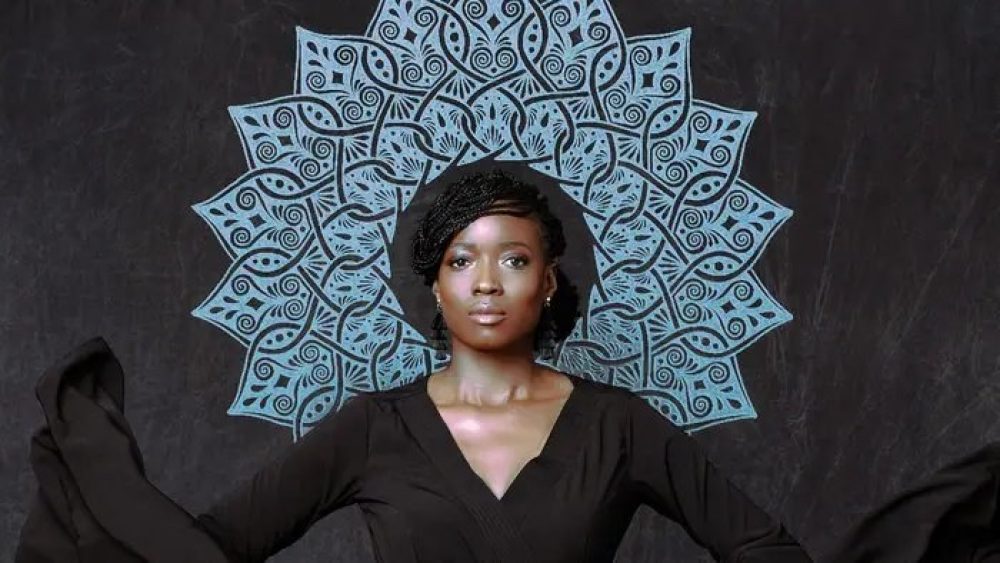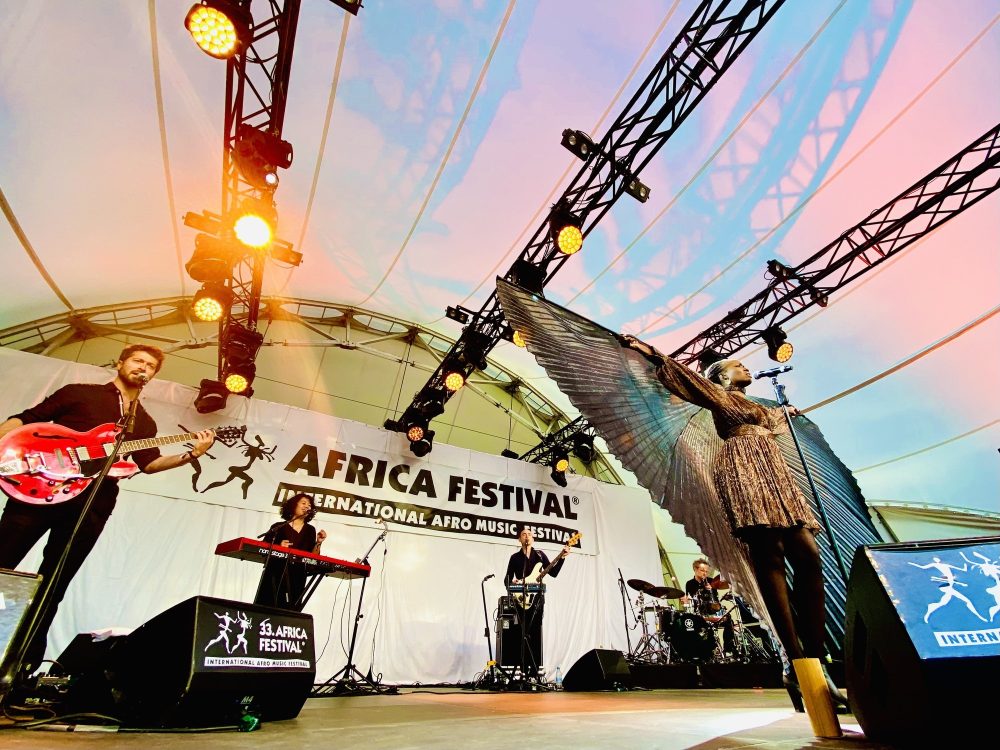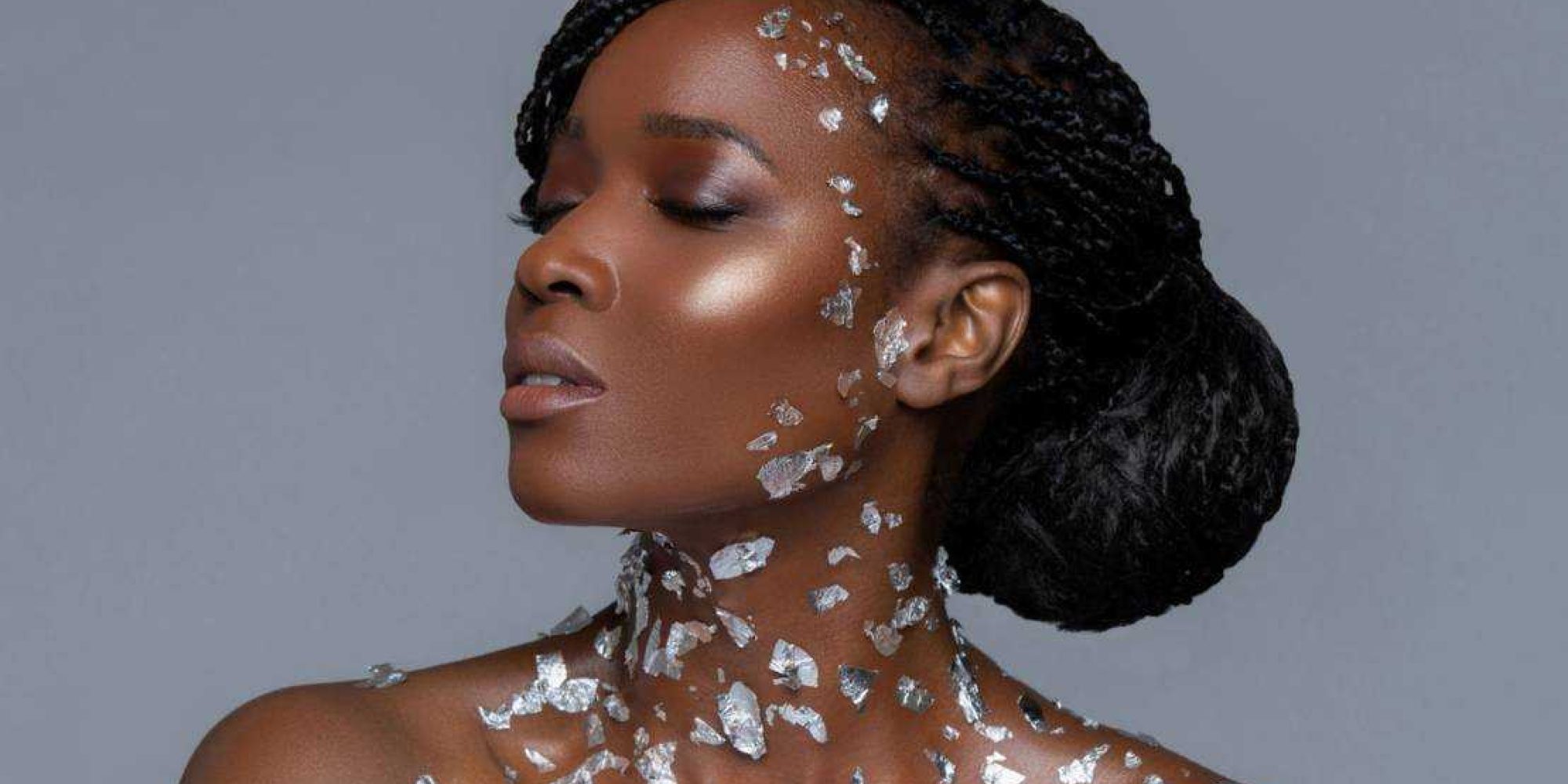The thrust of this year's Africa Festival in Würzburg, Germany was “Strong Women in African Music,” and they truly delivered a line-up of superb and diverse performers to prove their claim. One such performer who had the difficult job to play before the ever-strong Angelique Kidjo was Awa Ly.
Ly was born and raised in Paris, France of Senegalese parents. She moved to Rome, Italy just over 20 years ago to do a six-month internship to further her studies in international business, but wound up staying. And instead of a business career, she became both a singer, and occasional movie actress in Italian films. Encouraged by friends, Ly began going to open-mic jam sessions which eventually led to her meeting Italian musician/producer Massimo Giangrande who produced her first album, Modulated, in 2009, and continued their musical collaboration for many years after. Ly also toured the world, singing with Italian singer/songwriter Pino Daniele in 2013, then releasing a self-titled EP, in 2014 which she made through a crowd-funding effort. Here she is performing the song “Doum Doum Doum” from that EP, with Giangrande on guitar.
While the world of world music is quite vast, there seemed to be a lot of interconnecting threads among the performers at the Africa Festival this year. For instance, Awa Ly's 2016 album, Five and A Feather, was co-produced by Jean Lamoot (along with Delgrès https://afropop.org/articles/d...band leader Pascal Danaé), who also produced Lucia de Carvalho's most recent album. Both Awa Ly and Fafa Ruffino have collaborated with Daara J Family member Faada Freddy. And Moe Kouyaté, who formed festival headliners the Guineé All-Stars also collaborated on a track from her latest album, Safe and Sound.
We discussed all of this as we had a chance to briefly sit and meet Ly after her set.

Ron Deutsch: You left Paris for Rome for six months and stayed for 20 years?
Awa Ly: [Laughs] Yes, I was born and raised in Paris, but my origins are from Senegal. And I had been living in Italy, in Rome, for more than 20 years now. I was only supposed to stay there for six months. It was a love for Rome. I was mesmerized by the city. Then, I came back to Paris from Rome before the pandemic. I was supposed to stay in Paris just for a promotion, but then everything happened. All my stuff was still in Rome. But, you know, I try to follow the flow, and follow the signs. And all the signs seem to be saying that I need to stay in Paris for now, so I'm there.
You know some people are afraid when they don't know where they are going or what they are doing. I've just learned to be here, right now, as much as possible. It doesn't mean you don't need to have ambition or projects, but you will see – if you really listen – life will give you the signs. You have to be open for that.
Watching you on stage tonight, I was struck by how difficult it would be to try and classify you. Your music seems to move around many genres, often within the same song.
Ly: I really like not making music in any defined genre. I feel free to go wherever I want to go. If I want to change, or do more jazz, or more pop or soul, I'm free to do it. As I said, I was not born nor raised in Senegal but I know where I come from, and I have had this great opportunity to go to Senegal very often since I was a child. I know the country, have family there, and speak the language. But I'm French and I have the French style, but also the Senegal style. And they are both me. I'm really a mix of all that... and proud of that.
I'm here tonight at this Africa Festival because I really love all the people here, but I know my music is less in the cliché of “African music.” There are so many different styles of music here, and I want to show that music is all that.
You've also gone beyond just being a musician: You've also acted in motion pictures.
Ly: I was doing some movies in Italy, but music is my main thing. The acting thing was always coming at the right time – when I was not in the studio, not touring. And they were offering some roles. I never went looking for it. But I like it.
Before performing your song “Here,” from the Five and A Feather album, you took time to speak quite passionately about the ongoing immigration crisis. You described the Mediterranean Sea as a cemetery of refugees that have perished trying to make the journey to Europe. That was such a powerful image and I think I'll never look at the Mediterranean again without thinking of that. Then you urged the audience to try to think about whatever it is they can do to help with this crisis.
Ly: Maybe I talked too much.... I don't know. But for me, I'm tied to this notion of the earth, the world. I don't want to sound cheesy for saying this, but I really feel this larger thing that we have to think beyond one's country.... except only, [Laughs] maybe, during soccer games.
I really felt the energy of the crowd tonight, and also the suffering of all the people I'm talking about – the people coming on the boats. Even if I can get everyone just to think about this for a second, it's something I feel I can do. I just wish for people to be a bit more compassionate. As well, everything can turn around in life and we could be in that position, asking for help. Everyone takes for granted that everything is going fine for them and they won't need anything, or need that kind of help from anyone... but you never know. We need to think about it. But yes, if you do, you could be crying every day. I think, though, life is also about sharing the suffering in the kind of way that even if you can do just a little thing, to just do it, to not be selfish. How the world is right now, this is not working. So I ask that we just try to be kinder to each other, to your neighbor, to people in the street – tell someone they look beautiful today and then just go your way. You may just turn around the day of that person. I really believe in that.

Watching you on stage tonight, I was struck by how difficult it would be to try and classify you. Your music seems to move around many genres, often within the same song.
Ly: I really like not making music in any defined genre. I feel free to go wherever I want to go. If I want to change, or do more jazz, or more pop or soul, I'm free to do it. As I said, I was not born nor raised in Senegal but I know where I come from, and I have had this great opportunity to go to Senegal very often since I was a child. I know the country, have family there, and speak the language. But I'm French and I have the French style, but also the Senegal style. And they are both me. I'm really a mix of all that... and proud of that.
I'm here tonight at this Africa Festival because I really love all the people here, but I know my music is less in the cliché of “African music.” There are so many different styles of music here, and I want to show that music is all that.
You've also gone beyond just being a musician: You've also acted in motion pictures.
Ly: I was doing some movies in Italy, but music is my main thing. The acting thing was always coming at the right time – when I was not in the studio, not touring. And they were offering some roles. I never went looking for it. But I like it.
Before performing your song “Here,” from the Five and A Feather album, you took time to speak quite passionately about the ongoing immigration crisis. You described the Mediterranean Sea as a cemetery of refugees that have perished trying to make the journey to Europe. That was such a powerful image and I think I'll never look at the Mediterranean again without thinking of that. Then you urged the audience to try to think about whatever it is they can do to help with this crisis.
Ly: Maybe I talked too much.... I don't know. But for me, I'm tied to this notion of the earth, the world. I don't want to sound cheesy for saying this, but I really feel this larger thing that we have to think beyond one's country.... except only, [Laughs] maybe, during soccer games.
I really felt the energy of the crowd tonight, and also the suffering of all the people I'm talking about – the people coming on the boats. Even if I can get everyone just to think about this for a second, it's something I feel I can do. I just wish for people to be a bit more compassionate. As well, everything can turn around in life and we could be in that position, asking for help. Everyone takes for granted that everything is going fine for them and they won't need anything, or need that kind of help from anyone... but you never know. We need to think about it. But yes, if you do, you could be crying every day. I think, though, life is also about sharing the suffering in the kind of way that even if you can do just a little thing, to just do it, to not be selfish. How the world is right now, this is not working. So I ask that we just try to be kinder to each other, to your neighbor, to people in the street – tell someone they look beautiful today and then just go your way. You may just turn around the day of that person. I really believe in that.
And the struggle of the immigrant is what you are singing about in “Here,” which you co-wrote with the Daara J Family member, Faada Freddy. I also love that you made alternate recordings and videos of the song, featuring vocals with singers from different countries under the title “Here... and Everywhere”, like with Flavia Coelho for Brazil, Lura for Cape Verde, and Nawel Ben Kraiem for Tunisia.
Ly: Yes, I wrote the song with Faada Freddy. We also wrote the song “Fi Fë Lee,” with [Daara J Family’s] Ndongo D, which is on the extended “Gold Edition” of the new album, Safe and Sound.
“Here” is about when you've left your country just to save your life and you don't know what you're going to meet along the way. Is it worth it? To risk your life to find a better place? Sometimes, you just don't have a choice. You just know that where you are, you are surely going to die. Maybe where you are going you will find help. But so many people have tried to cross the Mediterranean Sea, and since 2014 more than 20,000 people have died there. It's like I said on stage, it's literally a cemetery. So that's what the song talks about. It says it's not a crime to search for shelter, for protection, for help. It's the basic things of life. The crime is not to help people when you can do it. Just because you're afraid… of what? Of what can you possibly afraid of? And then when you will need help, what will you say? We need each other. I don't want to say we're all on the same boat, but in the same sea.
And looking forward, what musical projects are in the works?
Ly: I have several new projects. One, with Abalye Cissoko, the kora master from Senegal. I'm also working with HK [the French singer and rapper].. And, of course, my own new album, which is going step by step, little by little. But I'm excited about what's coming, you know? Though, as I said, I'm just trying to live right here, right now.
Thank you for your time.
Ly: Thank you.

Related Audio Programs









